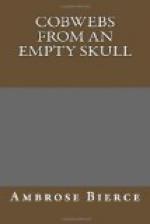“I was about to remark,” said the lion, “that while you were disputing, the cause of contention had hopped away. Perhaps you can procure another frog.”
To point out the moral of this fable would be to offer a gratuitous insult to the acuteness of the reader.
XII.
An ass meeting a pair of horses, late one evening, said to them:
“It is time all honest horses were in bed. Why are you driving out at this time of day?”
“Ah!” returned they, “if it is so very late, why are you out riding?”
“I never in my life,” retorted the ass angrily, “knew a horse to return a direct answer to a civil question.”
This tale shows that this ass did not know everything.
[The implication that horses do not answer questions seems to have irritated the worthy fabulist.—Translator.]
XIII.
A stone being cast by the plough against a lump of earth, hastened to open the conversation as follows:
“Virtue, which is the opposite of vice, is best fostered by the absence of temptation!”
The lump of earth, being taken somewhat by surprise, was not prepared with an apophthegm, and said nothing.
Since that time it has been customary to call a stupid person a “clod.”
XIV.
A river seeing a zephyr carrying off an anchor, asked him, “What are you going to do with it?”
“I give it up,” replied the zephyr, after mature reflection.
“Blow me if I would!” continued the river; “you might just as well not have taken it at all.”
“Between you and me,” returned the zephyr, “I only picked it up because it is customary for zephyrs to do such things. But if you don’t mind I will carry it up to your head and drop it in your mouth.”
This fable teaches such a multitude of good things that it would be invidious to mention any.
XV.
A peasant sitting on a pile of stones saw an ostrich approaching, and when it had got within range he began pelting it. It is hardly probable that the bird liked this; but it never moved until a large number of boulders had been discharged; then it fell to and ate them.
“It was very good of you, sir,” then said the fowl; “pray tell me to what virtue I am indebted for this excellent meal.”
“To piety,” replied the peasant, who, believing that anything able to devour stones must be a god, was stricken with fear. “I beg you won’t think these were merely cold victuals from my table; I had just gathered them fresh, and was intending to have them dressed for my dinner; but I am always hospitable to the deities, and now I suppose I shall have to go without.”
“On the contrary, my pious youth,” returned the ostrich, “you shall go within.”




